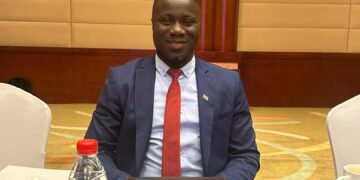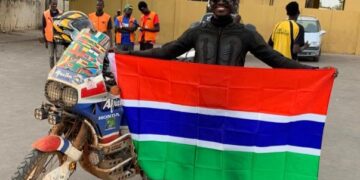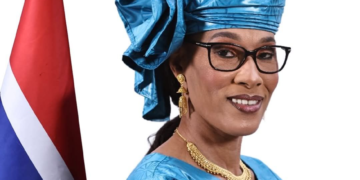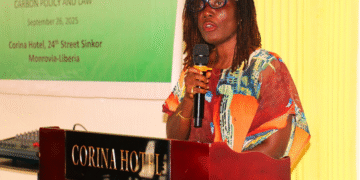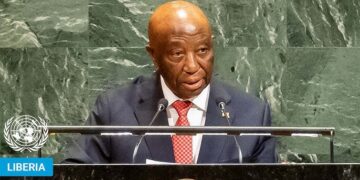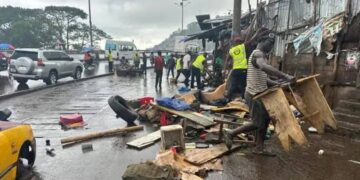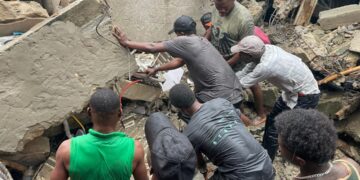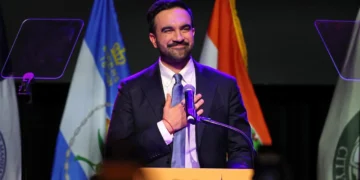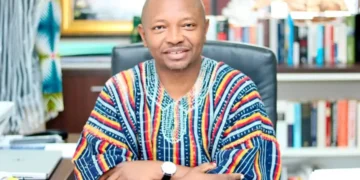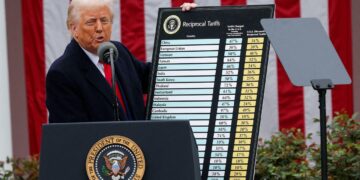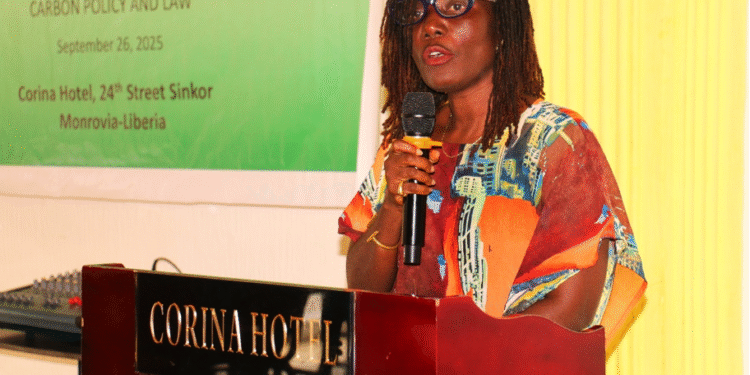As Liberia prepares for Potential Carbon Trading, ActionAid Liberia’s Country Director, along with key stakeholders advocating for a just transition and addressing climate change and environmental issues, is cautioning the Government of Liberia and actors pushing for carbon trading to proceed with extreme care.
She cites poor outcomes from similar carbon deals across Africa and the Global South that have failed to benefit communities, but have instead deepened environmental and social injustices, and at the same time points out to stakeholders that forest-dependent communities must not be sidelined.
According to Madam Elizabeth Johnson, for rural Liberians, the forest means life for them. It means food, medicine, building their homes, and shelters. Because of this, any decision or policy that may affect their livelihoods must be taken seriously.
She pointed out that the government has already developed a Carbon Market Policy despite forest communities’ rejection of the proposed plans to enter into carbon marketing. Madam Johnson emphasised that the voices of forest communities must be included and their perspective should be considered.
“When we talk about inclusiveness, we are saying that the voices of the people must be on the table, they should be heard, and they should fully participate, because the carbon issue we are talking about, they will be the ones to bear the brunt of it all.” Madam Johnson began by saying in her remarks at the Inclusive Stakeholder Consultation to support the development of Liberia’s Carbon Policy and Law.
She then expressed her hope that recommendations from ActionAid from the Carbon Market research that was conducted across Gbarpolu, Grand Kru, and Margibi forest communities, alongside forest communities in Kenya from a joint study conducted, would be considered by the team leading the development of the carbon policy that was launched by the government in mid-September this year.
Key among the recommendations presented and reechoed to the Environmental Protection Agency and Stakeholders working on Climate issues, Madam Johnson said, are: that community lands must be preserved. Communities must never be pressured to turn over control of their lands or forests, because land is life. It is important that there should be transparency and meaningful consultations, and the rejection of liabilities of failed carbon projects.
“Carbon Credit or carbon trade is not just unique to Liberia. There are other countries that have gone through this, and most countries that we have visited, it’s hard to actually find a success story, and at the end of the day, communities will be blamed.” Madam lamented.
Carbon markets are systems where countries or companies can buy and sell carbon credits to offset their greenhouse gas emissions. The idea is that emissions reduced in one place, often in the Global South, can be ‘sold’ to polluters, in short, those causing the crisis elsewhere, thereby allowing them to continue to emit or do the things that they are doing, which are causing the climate crisis. This idea is being promoted as a cost-effective climate solution, known as the carbon market or carbon trade.
However, activists and leading organisations in the climate justice advocacy space and frontline communities are criticising the carbon market ideology, describing it as a “False Solution.
They argue that the carbon market only allows big polluters and those causing the climate crisis to continue business as usual. On top of this, they are saying that when community forests are given into concessions, it means locals would no longer have access to their forest anymore and that forests and it would cost rural and communities a loss of their livelihoods and would further heighten poverty among rural residents whose forest may be given into carbon concessions.
But Madam Johnson was quick to point out that it is against this backdrop that forest communities from Kenya, Liberia, and ActionAid USA conducted the research to ascertain the perspectives of residents of forest communities who could bear the burden of failed carbon trading projects.
With the development of a carbon policy, which ActionAid and other Civil Society actors have been raising critical questions about the policy say since it’s a clear indication that the Government of Liberia has settled down to venture into the carbon market, below are some recommendation Madam Johnson said are citied in the report: that forests communities are also kicking against the issue of “Middle-Man” and that financial benefits to communities whose forest may be given into carbon trading must go directly to the communities and not be tapped off by external actors, communities must never be pressured to take control of their lands, ensure transparency and meaningful consultations, with communities full consent among other key recommendations.
Madam Johnson concluded her remarks by saying that having a carbon policy is not an assurance, but the systems that would be set must ensure that there are accessible grievance and redress mechanisms, and that the policy does not shield and protect the polluters over the targeted beneficiaries and the people and that any policy that impacts forest communities must prioritise their lived realities.
Stakeholders, including renowned human rights lawyer Tiawon Gongloe, the World Chimpanzee Foundation, emphasised that indigenous and rural communities have sustainably preserved Liberia’s forest for generations, long before concessions, mining, and logging began to exploit Liberia’s land, fueling poverty and accelerating the climate crisis.
|
||||
Gongloe said the carbon market must not become the new face of environmental exploitation. Forest communities must be at the center of climate change and that the government cannot say it want to contribute to solving the climate crisis, but it is at the same time still government out the country’s forests into concession to logging and mining companied who are constantly causing land degradation, wiping away Liberia’s forest, but yet wanting to venture into Carbon Trading.
Gongloe recounted how back in the days, his village reserved the trees and forests by upholding strange rules and regulations against endangering the environment.
“Those days, while growing up in Nimba, we had a huge forest and river near the town, and the rule was no one cut any trees or hunted in the forest,” Gongloe remembered saying.
He also went on to share how “There were places reserved for years until later people came and said the action of the town was devilish and evil, and they brought in power saws, big machinery, and started clearing those places.” Gongloe told the audience.
Gongloe is calling for stronger laws to preserve Liberia’s forests and trees.
“Today, we are talking about climate change and carbon credits. Our people had better ways to preserve the forest, but we didn’t learn from them. Mining and logging are also destroying our forests, so there has to be strong law enforcement.”
The Liberian lawyer reflected further by reminding stakeholders that, at the time he was solicitor general, there were times he flew using a helicopter across the country, and for about thirty minutes, they would fly without seeing any town or clear ground. He noted that it was so because everywhere was covered with a thick canopy of forest and trees, but stressed that all that has gone away due to deforestation, logging, and mining activities given into concessions given by the very government.
The World Chimpanzee Foundation’s chief executive, Dr. Annika Hillers, in her remarks, did not mince her words. She pointed out to the audience that what she sees happening to Liberia’s forest and the depletion is a clear “conflict of interest” of the Liberian government, continuously awarding forests into concessions and the encroachment of protected areas.
|
“What I am seeing in Liberia is that, instead making use of the opportunity to have sustainable income, for sustainable development through carbon project, right in front of our eyes, Liberia forests are disappearing and we are not only talking about farming activities, or illegal mining, but we are talking about the constant conflict of interest among different government agencies and if you don’t protect the trees, the forests, the mangroves, you will never get carbon projects.”
She expressed her frustration over ongoing struggles between and among the Ministry of Commerce, the Forestry Development Authority, and the Environmental protection Agency as to who should be responsible for carbon trade, because according to her, everyone believes “that is where the money is and they want to be in charge.”
But she quickly registered that while the struggle continues as to who would control Liberia’s carbon market trade, in the face of this, the forests are depleting and no one is concern while proposed protected areas are reducing because those areas are being given by the government to mining and logging concessions.
With this, Dr. Annika Hillers stressed that this leaves her wondering as how the carbon marking arrangement is going to work well in Liberia when everybody is trying to develop beautiful policy to attract millions while at the same time depleting the forests.
In her conclusion she emphasized that Liberia could be the lead country in West Africa to raise millions and billions of dollars from carbon trade, but she pointed out that there’s not a single, efficient, running carbon project in Liberia that is benefiting communities for decades.
According to the international World Resources Institute (WRI), last year, Liberia has lost at least 23 percent of its primary forest to deforestation while between 2002 to 2022 the Global Forest Watch reported that Liberia lost 315kha of humid primary forest, due to deforestation and illegal activity tracker.
Liberia is among the top ten countries that have experienced increased primary forest lost as of 2022.
According to the international World Resources Institute (WRI), last year, Liberia has lost at least 23 percent of its primary forest to deforestation while between 2002 to 2022 the Global Forest Watch reported that Liberia lost 315kha of humid primary forest, due to deforestation and illegal activity tracker.
The total forested land space of Liberia earlier covered was around 4.2 million hectares which constituted 43.4% of the country’s total land area. but the current wave of deforestation which stands at 30,000 hectares annually
with conversion for agriculture and mining being the main drivers with uncontrolled logging being the major cause of the forest depletion, according to the Timber Trade online Portal
The climate crisis is driven largely by greenhouse gas emissions from industrialized nations, thus posing severe global threats. however, the poorest regions, especially the Global South and Africa continue to face the harshest, despite Africa contributing less than 4% of the global emission.
Rising temperatures, floods, food insecurity, droughts, continue to disproportionately affect these areas due to the limited resources and weaker infrastructures and Liberia is no exception. Agriculture-dependent economies are suffering from unpredictable weather, thereby threatening livelihoods and deepening poverty, food security is at the bank, while coastal communities in Liberia and regions hard hit by climate change are facing displacement.
This stark injustice clearly civil society stakeholders say highlight a global inequality, and those least responsible for the climate change are the most vulnerable to its devastating consequences, underscoring the urgent need for climate justice.

